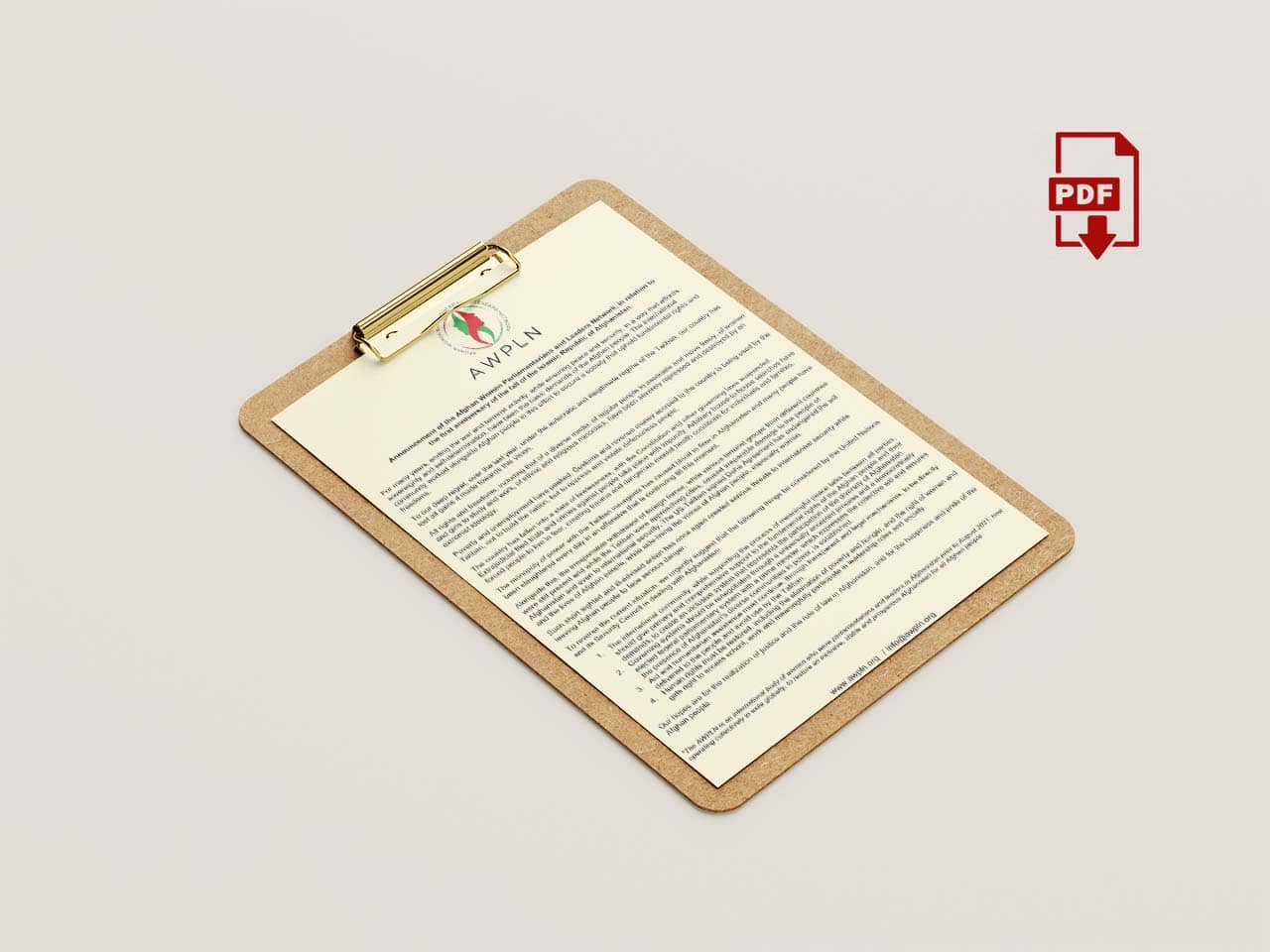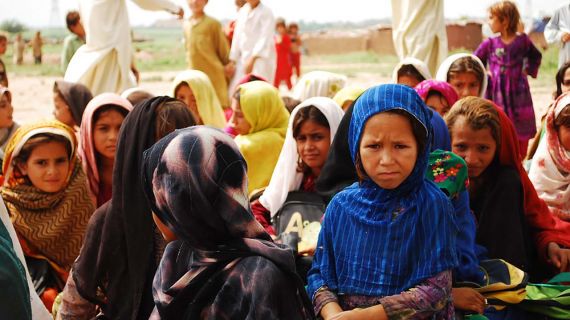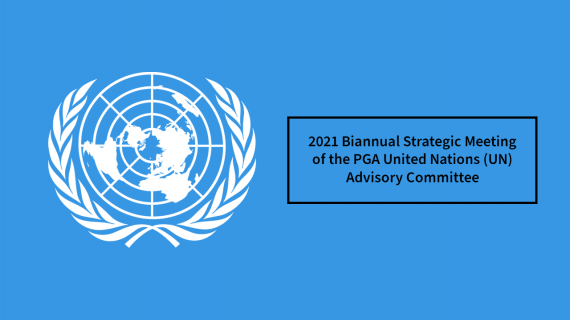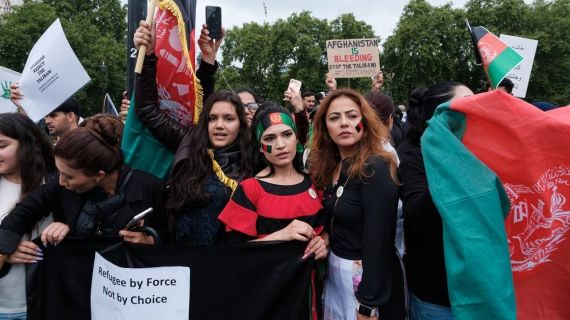The International Community seems not to have learned from its mistakes
New York/The Hague,
15 August 2022
Today, we mark the tragic first anniversary since the
Taliban took over Afghanistan and reinstated an unconstitutional de facto
government, which obtained power in violation of the US-Taliban “deal” entitled
“Agreement for
bringing peace to Afghanistan” and designed to prepare for a peace agreement between
the Taliban rebels and the Afghan central government that never took place.
Despite the Taliban’s promise of an “inclusive” government
composition and respect for human rights, Afghan communities and individuals –
especially women and girls – have been subjected to serious human rights
violations and deprivation of their fundamental freedoms by the new regime. Such
widespread or systematic violations may constitute crimes against humanity, and
their perpetrators should be promptly investigated and prosecuted under
applicable International Law.
For almost 20
years, Afghans had worked tirelessly to build a stronger and more democratic
State, but their struggle was significantly weakened and compromised by the protracted
impunity for the gross human rights abuses committed by the Taliban and their
allies, by warlords that formerly belonged to the Northern Alliance, as well as
by armed groups that took part in the so-called “global war on terror.” As
reported by experts, NGOs, and UN bodies cited in an enlightening statement by
the US Institute for Peace (USIP) in April 2022, all the efforts to create a
new Afghanistan based on the Rule of Law and justice were negated by the
pro-impunity policies supported by the most important forces in the
International Community, which even blocked the publication by the UN High
Commissioner for Human Rights in 2005 of a massive human rights mapping report that
could have served as a basis to incriminate the alleged perpetrators of atrocities
committed in the previous 40 years (see reports by
Afghanistan analysts network and USIP)
As history has taught us, impunity for past atrocities
represents a major incentive for present and future atrocities: This is the
scenario that one can observe in Afghanistan in the first year of return to
power of the Taliban’s totalitarian regime.
In 2021, when the U.S. and other allies’ troops started
to withdraw from Afghanistan, the Afghan Army underwent a rapid process of
defection and self-dissolution that led to the fall of Kabul on 15 August 2021,
almost without resistance. Since then, the civilian population has been at the
center of harsh repressions and denial of human rights. The United Nations Assistance Mission in Afghanistan (UNAMA), established by the
Security Council Resolution 1401 (March 2002), reported on the gradual disappearance of women's and
children’s rights to education, work, and ability to appear in public spaces. The
previously established specialized domestic mechanisms created to address violence
against women have been dissolved, leaving gender-based crimes unpunished. Notwithstanding
the issuance of decrees preserving the right of women to consent to marriages,
UNAMA has noted instances where the de facto authorities have upheld
forced marriages. Legal proceedings lack transparency and are characterized by
procedural irregularities.
Extrajudicial killings have been reported alongside
inhuman and degrading punishments for individuals accused of “moral” crimes,
and the treatment of juvenile detainees has also been noted as a key concern. Furthermore,
despite a reduction in armed violence since August 2021, an increase in
civilian casualties has been identified in the Khorasan Province. As of 15 June 2022, UNAMA reported that at least 59%
of the population was in need of humanitarian assistance. The UN Office for the
Coordination of Humanitarian Affairs reports that 24.4 million Afghans are “in
need,” 12 million of whom are children.
Since the takeover, human rights defenders have faced
near-daily attacks and violent reprisals, including arrests, torture, threats,
and killings. Escalating violence in the provinces has forced many civilians to
leave their homes and relocate and/or resettle. While thousands of men,
children, women, human rights defenders, journalists, government
representatives, and Members of Parliament were able to flee into exile to
start anew, many feel that the International Community left them behind with
many unfulfilled promises. With a 15-year rising trend of internal displacement and numbers of refugees rapidly
increasing following the Taliban takeover, Afghan refugees have also been victims of serious human rights violations in the neighboring countries where they have sought protection
(e.g., Iran, Pakistan, Uzbekistan, Tajikistan, Malaysia, and Turkey, among
others).
Since early last year, Parliamentarians for Global
Action (PGA) has hosted three Roundtables (see here, here, and here) with legislators, partners, civil society, experts, and
ambassadors, worldwide to contribute to the prevention of atrocity crimes and
improve the safety and security of Afghan civilians in exile and on the ground.
During its last roundtable dedicated to Supporting Afghan Nationals on the ground and in
Exile on 30 May 2022,
PGA called on Members of Parliaments, governments, international organizations,
and other relevant stakeholders to take concrete measures to engage in a
meaningful way and elaborate tangible responses to support Afghans on the
ground and in exile. PGA reiterated full support for human rights defenders,
NGOs, and civilians on the ground and in exile and called upon the
International Community and Members of Parliaments from all over the world to
provide more support for Afghanistan.
PGA stresses
that it is of the utmost importance for the International Community to live up
to its commitments and immediately translate them into tangible actions. Parliamentarians from all over the world need to
engage meaningfully with their Afghan counterparts and communities in exile to
ensure that their countries’ responses follow a human rights approach,
including guaranteeing the protection of the rights of Afghans seeking asylum
globally.
It is crucial to
ensure access to justice, accountability, and redress for the victims of the
most severe human rights violations and hold the Taliban leaders and other
alleged perpetrators accountable for the crimes against humanity and, as
appropriate, war crimes. Widespread or systematic patterns of inhumane acts
directed against the civilian population, including women and children, are
crimes against humanity defined in Article 7 of the Rome Statute of the ICC, an
instrument Afghanistan has been a State Party since February 2003. PGA,
therefore, calls upon the relevant organs of the ICC to take all the necessary
decisions to ensure that appropriate Pre-Trial proceedings take place as early
as possible, hence starting to remedy dramatic delays accumulated in almost two
decades of inexplicable inertia concerning investigations and prosecutions on
Afghanistan: The time has come for the ICC to move forward and ensure that
crimes within its jurisdiction are impartially investigated.
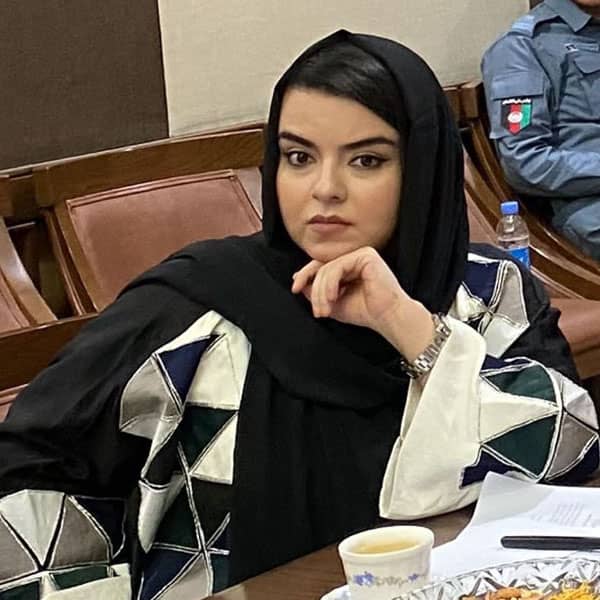 This fight is about justice and accountability; the survival
of life and our nation; the assurance that impunity will not prevail again, and
that the Rule of Law, the ideals of freedom and democracy, will be reinstated
in Afghanistan. We cannot live out of expectations. The world can no longer
watch as atrocities and mass violations continue. The world’s justice will lose
its meaning and importance if it is only carried with selectivity. Those most
responsible need to be held accountable through national and international
mechanisms available. Our community wishes a stable, prosperous, democratic,
and free Afghanistan.Hon. Mariam
Solaimankhil (MP, Afghanistan,
in exile), Member of the Parliamentary Rapid Response Team (PARRT)
This fight is about justice and accountability; the survival
of life and our nation; the assurance that impunity will not prevail again, and
that the Rule of Law, the ideals of freedom and democracy, will be reinstated
in Afghanistan. We cannot live out of expectations. The world can no longer
watch as atrocities and mass violations continue. The world’s justice will lose
its meaning and importance if it is only carried with selectivity. Those most
responsible need to be held accountable through national and international
mechanisms available. Our community wishes a stable, prosperous, democratic,
and free Afghanistan.Hon. Mariam
Solaimankhil (MP, Afghanistan,
in exile), Member of the Parliamentary Rapid Response Team (PARRT)
Today, at this
critical time for Afghans, PGA urges all its members to increase support, mobilize resources, and advocate
for their governments to act and keep the situation in Afghanistan as a top
priority in their agendas. Parliamentarians hold a vital role in the fight against impunity and the
protection of human rights. The Taliban regime must be held accountable for
perpetuating international crimes and human rights violations. Only united we
can succeed.
The following action points, which were developed following the rich exchange that took place during the third PGA Roundtable on Afghanistan on 30 May 2022, should therefore be taken into consideration by the international community:
I. On General Support for Afghanistan from the International Community and Members of Parliaments all over the world:
- Keep the situation in Afghanistan a top priority on the international agenda and send strong messages: the multiplication of crises all around the world should not push the situation in Afghanistan to the background, especially regarding the status of women’s and girls’ rights, which represents the worst women’s rights crisis since 1996. What is happening in Afghanistan affects all countries worldwide, and it is the international community's responsibility to continue addressing the situation: we cannot forget about Afghanistan.
- Allow Afghans to raise their voices in international, regional, and national fora: it is of utmost importance to listen to their expertise and to include them in any discussion aiming at calibrating the international community response to address the deteriorating situation in their country.
- Develop partnerships and give space to Afghan actors in your home country, including democratically elected Afghan Members of Parliaments: invite them to speak in your national parliaments so that any government and civil society actor can listen carefully to their voices and ensure support, and build a partnership with them to stay in close contact.
- Do not recognise the Taliban as the legitimate government: when engaging with the Taliban de facto authorities, avoid taking any step that would grant them legitimacy. Whenever possible, targeted development cooperation efforts shall be directed towards Afghan civil society, professional associations and other entities, including relevant international organizations and NGOs, that are able to bypass the controls and scrutiny from the Taliban oppressors (see, for example, the expanded approach developed by the World Bank to supporting the people of Afghanistan).
- Reflect on targeted sanctions that will impact the Taliban and international actors engaging with them without imposing more suffering on the Afghan population: Afghan nationals are already suffering too much from intersecting crises, including economic and food supply crises and lack of healthcare services. Afghan people should not pay an even higher price for the Taliban’s abuses, and their lives should not be at an even higher risk.
- Build a leadership to drive an international community coordinated and concerted answer to the situation in Afghanistan: it is crucial that countries committed to implementing a feminist foreign policy lead the international community response to address the situation and continue building a larger consensus at the international level on the protection and promotion of human rights in Afghanistan so that statements turn into practical actions.
- Actively and effectively monitor the human rights situation and report on human rights violations, including on issues relevant to women and girls: although accessing reliable monitoring of the human rights situation, including in Afghan provinces, remains a challenge, it is of utmost importance that the international community supports the UN Assistance Mission in Afghanistan (UNAMA), and the UN Special Rapporteur on the situation of human rights in Afghanistan, Mr. Richard Bennett, in fully implementing their respective mandates.
II. On the Humanitarian Situation in Afghanistan:
- Continue supporting human rights defenders and independent NGOs actively working on the ground: implement precise mechanisms to enable them to work from a safe place. In particular, support NGOs with grassroots and connections on the ground to help them reach people living in isolated areas, including people in hiding, and ensure that these people also have access to humanitarian assistance.
- Unite your voices to denounce any pressure or attacks targeting human rights defenders and independent NGOs: speak up when reports underline attacks and abuses against human rights defenders, protesters, women and girls, or any religious or ethnic minority.
- Help restore central banking functions to enable the resumption of basic services for the population within the Afghan economy while ensuring no recognition for the Executive branch of the de facto Taliban government: the severe ongoing economic crisis that Afghans face worsens their already precarious situation. The frozen funds should be used for Afghan citizens, with the appropriate oversight by the Central Bank;
- Calibrate any humanitarian assistance according to the specific needs of Afghans by listening to their voices: it is a priority to include Afghans in any action related to Afghanistan, especially when it comes to humanitarian assistance: they know best what Afghans need, depending on the different provinces where they are located.
- Reengage with Afghanistan on the ground: human resources are needed on the ground to help Afghan nationals and mitigate the damages and trauma. Practical support and humanitarian assistance to the Afghan society should be strengthened, including the one already provided by UN agencies working on the ground.
III. On the Rights of Afghans to Seek Asylum:
- Ensure that Afghans’ right to seek asylum is respected and avoid applying double standards: Afghan nationals are fleeing persecution. They have the right to seek asylum and find a place where their lives will not be at risk anymore. Their cases must remain a priority for the entire international community, not only neighbouring Afghan countries. These refugees have expertise that will contribute to any society.
- Encourage the office of the United Nations High Commissioner for Refugees (UNHCR) to facilitate the procedure to provide asylum certificates to Afghan refugees: such certificate is the only document that will give Afghans their refugee status, thus allowing them to have access to basic services and to proceed with their resettlement applications. The UNHCR should guarantee a safe and rapid procedure with integrity. These individuals and families have left everything behind and generally deal with significant trauma: it is of utmost importance that the UN assist them in the best way possible so that their living conditions do not worsen.
- Government resources need to be devoted to expedited processing applications: the procedure length represents an additional element that threatens Afghan lives. Governments should therefore ensure that the necessary financial and human resources are allocated to these processes, which should also be more accessible.
- Continue evacuations for those seeking to flee and facilitate safe resettlement, as well as international cooperation for family reunification: there is still a long way to go on evacuation, as the majority of countries that have pledged to evacuate a certain number of Afghans have not reached their threshold - not to mention that a far greater number of Afghans, including some who have worked with the international community, are at great risk and left without assistance from this same international community. It is also necessary to ensure safe resettlement, especially for women and girls who continue to face heinous crimes such as sexual crimes, gender-based violence, human trafficking, harassment, and other forms of abuses in shelters and elsewhere.
- Once resettled in a safe place, help Afghan refugees to rebuild their lives: assist them in finding jobs and training that fit with their expertise and will allow them to contribute to the society, ensure that Afghan students can continue their education, and earmark mental health resources to help them heal from trauma.
- Build and support networks to expand Afghans’ legacy: Afghans need peer support, and their knowledge, expertise, culture, and heritage cannot be lost.
IV. On Fighting against Impunity:
- Ensure that those responsible for human rights violations and the commission of international crimes are held to account before a court of law that abides by the principles of Rule of Law and international standards: this must include holding the Taliban accountable for their crimes and Afghanistan responsible for its obligations under international law.
- Support the ICC to move forward with its investigation on Afghanistan, which should include a specific focus on gender persecution and the enslavement of children: efforts to investigate war crimes and crimes against humanity on the territory of Afghanistan or by its nationals since 1 May 2003 should be strengthened.
- Develop mechanisms for accountability and reparations for victims, including by activating the principle of universal jurisdiction or any other accountability mechanism: Afghans have waited for justice for too long. The fight against impunity should remain a priority, and countries should effectively adopt domestic legislation that incorporates the definitions of international crimes.
- Victims must be at the centre of any process: victims’ inalienable rights to truth, justice, reparations, memory, and guarantees of non-recurrence must be respected and guaranteed.
- Implement effective counter-terrorism policies that follow a human rights-based approach to eradicate the threat of terrorism and extremism: the rise of radicalism and extremism is a phenomenon that can affect any country. Concrete tools that follow a human rights-based approach need to be adopted to avoid these phenomena to spread and protect universal values, democracy, justice, freedom, and human rights. When terrorist attacks arise to the gravity-scale of crimes against humanity, they shall be qualified as such, and the ICC and other mechanisms shall be triggered without hesitation, which characterized past failed efforts to fight impunity.
This fight is about justice and accountability; the survival of life and our nation; the assurance that impunity will not prevail again, and that the Rule of Law, the ideals of freedom and democracy, will be reinstated in Afghanistan. We cannot live out of expectations. The world can no longer watch as atrocities and mass violations continue. The world’s justice will lose its meaning and importance if it is only carried with selectivity. Those most responsible need to be held accountable through national and international mechanisms available. Our community wishes a stable, prosperous, democratic, and free Afghanistan.Hon. Mariam Solaimankhil (MP, Afghanistan, in exile), Member of the Parliamentary Rapid Response Team (PARRT)

